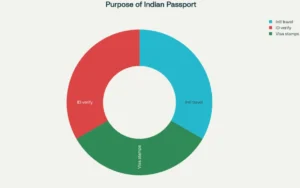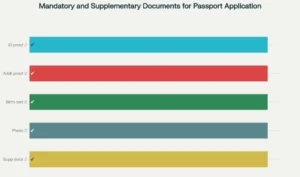Introduction to Passport Application in India
A passport serves as an essential document for individuals in India, facilitating both domestic and international travel. It functions not only as a legal requirement for leaving the country but also as an identification tool that can be crucial for various purposes within the nation. For travel abroad, a passport is mandated by immigration authorities, enabling citizens to traverse borders and experience the diverse landscapes and cultures that the world has to offer.

In the context of international travel, the importance of a passport cannot be overstated. It serves as proof of identity and nationality, which are prerequisites for entering most foreign nations. A valid passport is often accompanied by visas, which are granted based on the destination country’s entry requirements. Without this vital document, individuals are restricted in their ability to explore opportunities such as educational programs, employment chances, and global networking.
Moreover, having a passport is also valuable for domestic purposes. Individuals may need it for official identification, applying for government services, or even boarding domestic flights. It fosters a sense of security and assurance while proving one’s identity in various scenarios. Thus, possessing a passport is not merely a formality but a necessity in today’s interconnected world.
To obtain a passport in India, one must follow a well-defined legal framework and adhere to some essential procedures. This structured approach assures that the application process is efficient and transparent, aligning with the regulations set forth by the Ministry of External Affairs. The upcoming sections will provide a comprehensive step-by-step guide, detailing everything from application forms to necessary documentation, ensuring that individuals are well-equipped to navigate the passport application process successfully.
Eligibility Criteria for Indian Passport
Obtaining an Indian passport is contingent upon meeting specific eligibility criteria. The age requirement is one of the foremost considerations; applicants must be at least 18 years old to apply for an adult passport. For minors, defined as individuals under 18 years of age, a passport application must be submitted by a parent or legal guardian on their behalf. Additionally, applicants should have Indian nationality; non-citizens are not eligible for an Indian passport.
An important aspect of the eligibility criteria involves documentation. Applicants must provide proof of identity and address, which is typically verified through government-issued identification such as an Aadhaar card, voter ID, or a driver’s license. To ensure a smooth application process, it’s crucial to possess all necessary documents in their original form, as well as photocopies. Among the required documents, applicants should also submit a birth certificate, which serves as proof of date of birth, particularly for minors. In cases of name changes, legal evidence affirming this change may also be required.
Additionally, the applicant must not have any criminal convictions that could hinder their eligibility. Individuals who have been involved in legal disputes or have outstanding warrants may face difficulties in obtaining a passport. It is also worth noting that special provisions exist for certain categories, such as emergency passport applications or those requesting a passport for official travel and business purposes. Overall, understanding these eligibility requirements is essential for a seamless passport application process in India.
Documents Required for Passport Application
Applying for a passport in India involves the submission of various documents, which are categorized into mandatory and supplementary types. Understanding the requirements for each category is essential to ensure a smooth application process.
Mandatory Documents: These documents are essential and must be submitted along with the passport application form. The primary document required is proof of identity, which can be established through a government-issued photo ID, such as an Aadhaar card, voter ID, or driving license. Additionally, applicants need to provide proof of address, which can be furnished through documents like a utility bill, bank statement, or rental agreement, clearly showing the current address and the applicant’s name.

Another important document is the applicant’s birth certificate, which serves as proof of date of birth. In some cases, a school leaving certificate or any other relevant legal document may be accepted. A recent passport-sized photograph following specific guidelines, generally 2×2 inches in size, must also be included. This photograph should have a plain background and should capture the applicant’s face clearly.
Supplementary Documents: While these documents are not compulsory, they can support the application under certain circumstances. For instance, if applying under a different name (such as after marriage), it is advisable to include a marriage certificate, affidavit, or newspaper publication confirming the name change. If the applicant is applying for a passport for a minor, additional documents such as parents’ passports or their duly signed consent will be necessary.
It’s crucial to ensure that all documents meet the specific formats and specifications outlined by the Passport Seva Kendra (PSK). Keeping these guidelines in mind will facilitate the application process and reduce the risk of delays or rejections.
Types of Passport Application Forms
In India, the process of applying for a passport is streamlined by offering various types of application forms to cater to diverse needs and circumstances. Primarily, there are two categories of passport application forms: the standard application and the Tatkal application. Understanding these options is vital for applicants to make informed decisions based on their urgency and requirements.
The normal passport application form is the standard procedure for most individuals applying for a passport. This application form is suitable for those who do not require an expedited service and can afford to wait for the processing time, which typically ranges from 10 to 30 days. It is ideal for regular passport seekers who plan their travel in advance and are not facing time constraints.
On the other hand, the Tatkal passport scheme provides an expedited process for individuals needing a passport urgently. This service is especially beneficial for those with unforeseen travel needs or emergencies, such as medical treatments, job assignments, or attending important family functions. The Tatkal application form ensures that the passport is processed within 1 to 3 days, albeit at a higher fee compared to the normal application.
Both types of application forms have specific eligibility criteria and require distinct documentation to proceed. For example, the Tatkal scheme mandates applicants to present valid proof of travel bookings or urgent reasons for travel, while the normal application requires standard identification documents and proof of residence.
In choosing the appropriate passport application form, individuals should assess their urgency and travel plans carefully. By selecting the correct form, applicants can navigate the process more efficiently and reduce potential delays in obtaining their passports.
Step-by-Step Process to Apply for a Passport
Applying for a passport in India involves several systematic steps that ensure a smooth application process. To begin, you may choose between submitting your application online or offline. If you opt for the online method, visit the official Passport Seva website. Create an account if you do not possess one, and log in to access the application form. Fill out the required details accurately, including personal information and documentation, which is critical to avoid delays. Once completed, submit the application and make the payment via the available options—credit card, debit card, or internet banking.
For those who prefer the offline option, you can procure a physical application form from a designated Post Office or Passport Seva Kendra (PSK). Complete the application form with precision and verify all information before proceeding with submission. Similar to the online process, you must also pay the application fee, which varies based on the type of passport requested.
Next, regardless of the application method chosen, schedule an appointment at the nearest Passport Seva Kendra. This can be accomplished through the Passport Seva website. During the appointment process, you may find an available time slot based on your location and preferred PSK.
On the day of your appointment, ensure that you carry all necessary documents, including identification proof, address proof, and any other relevant documents specified on the official website. You may be required to participate in an interview step where officials may clarify details regarding your application. This step is significant as it assesses the authenticity and validity of your request.
Upon successful verification, your application will be processed, and you can track its status through the Passport Seva portal. This step-by-step process, when followed diligently, will aid in obtaining your passport in an efficient manner.
Passport Fee Structure
The fee structure for obtaining a passport in India varies based on the type of application and the urgency with which it is required. Applicants can choose between the normal service and the Tatkal service, each with distinct costs. As of October 2023, the fee for a normal passport application is INR 1,500 for a 36-page passport and INR 2,000 for a 60-page passport. In contrast, the Tatkal service, which offers expedited processing, incurs a fee of INR 3,500 for the 36-page passport and INR 4,500 for the 60-page passport. The Tatkal option is especially beneficial for individuals who require their passport urgently, typically within one to three days.
In addition to the basic application fees, applicants should also be aware of potential extra charges for optional services. For example, document delivery through a courier service may incur an additional fee, which varies based on the service provider and the delivery location. Furthermore, if a police verification is required for the application—which is common for first-time applicants—this may also involve additional costs, especially if special procedures or expedited services are requested. It is crucial for applicants to verify these charges at the time of application, as they may impact the overall budget for obtaining a passport.
Accepted payment methods for passport applications in India include online payment through various digital platforms, credit and debit cards, and popular e-wallets. It is advisable to check the latest updates on the official Passport Seva website as the fee structure and available payment methods can be subject to revisions. Being informed about the full range of costs associated with passport applications ensures that applicants can navigate the process with ease and clarity.
Appointment Scheduling and Biometrics Submission
To initiate the passport application process in India, one of the crucial steps is to schedule an appointment at the Passport Seva Kendra (PSK). The appointment can be booked online through the official Passport Seva website. To begin, applicants must first register on the portal by providing necessary personal details. Once registered, you can log in to your account, navigate to the appointment scheduling section, and select your preferred PSK location. It is advisable to book your appointment at the earliest possible date to avoid any potential delays in the application process, particularly during peak travel seasons.
After choosing a date and time, ensure to confirm your appointment. A confirmation slip will be generated, which you must print and carry for your visit to the PSK. In addition to your appointment slip, it is essential to gather all the required documents, including proof of identity, address verification, and any supporting documents depending on your application category.
On the day of the appointment, arrive at the PSK well in advance. Upon arrival, you will undergo a preliminary security check before proceeding to the biometrics submission area. The biometrics process involves capturing your fingerprints and photograph, which are integral to the processing of your passport application. It is important to note that this procedure may take some time, and applicants should be prepared for possible delays. Therefore, remaining patient and ensuring that all documents are ready can help facilitate a smoother process. Adequate preparation and timely arrival will not only enhance your experience but also minimize the likelihood of any issues arising during your visit.
Tracking Your Passport Application Status
Tracking the status of your passport application in India is a straightforward process that can significantly ease the anxiety of waiting for your passport. The Ministry of External Affairs (MEA) provides multiple methods for applicants to track their application status effectively. One of the most accessible options is through the online portal designed specifically for tracking passport applications.
To track your passport status online, you need to visit the official passport website. Once there, you can navigate to the ‘Track Application Status’ section. By entering your application reference number and providing your date of birth, you will be able to view the real-time status of your application. This online tracking system is particularly beneficial as it gives you up-to-date information on each stage of the processing.
In addition to online tracking, applicants can also utilize SMS services offered by the passport authorities. By sending a specific SMS with your application details to the designated number, you will receive updates directly on your mobile device. This is a convenient method, especially for those who may not have regular access to the internet.
The typical processing time for passport applications in India may vary based on several factors, including the type of application (normal or tatkal) and the applicant’s location. Generally, it may take anywhere from 7 to 15 working days for normal applications and a shorter time frame for tatkal services. However, delays can occur due to various reasons, such as verification issues or missing documentation.
In the event of a delay, it’s advisable to revisit the tracking portal or contact the relevant passport office for assistance. Regular monitoring of your application can help in promptly addressing any issues that may arise during the processing phase, ensuring that your passport is issued in a timely manner.
Common Issues and Troubleshooting
Applying for a passport in India can sometimes present various challenges that may hinder the process. Some of the most common issues applicants face include document rejection, appointment delays, and incorrect application details. Understanding how to effectively troubleshoot these problems can significantly streamline the application experience.
One frequent issue is the rejection of documents. This may occur due to the submission of incomplete, outdated, or incorrect documents. To mitigate this risk, applicants are advised to thoroughly review the list of required documents on the official passport website and ensure all submissions adhere to the specified format. In the case of rejection, the Regional Passport Office (RPO) provides detailed reasons for the denial, allowing applicants the opportunity to rectify the mistakes. If issues persist, contacting the Passport Seva Kendra (PSK) or the RPO directly can provide further clarity and guidance.
Another common hurdle is appointment delays, which can extend the application timeline significantly. It is vital to schedule appointments at the earliest possible date, as slots can fill up quickly. In case of a last-minute cancellation or rescheduling, applicants should regularly check the official website for availability. Utilizing the online tracking system provided by the Ministry of External Affairs can also help applicants stay informed about the status of their application and any appointments.
Moreover, applicants often encounter difficulties with inaccurate information on their applications. This can lead to additional queries or the requirement for resubmitting documents. To avoid this, it is essential to double-check all entries before submission and ensure consistency across all documents. If discrepancies are found after the fact, applicants should take immediate action to correct the information and follow up with the appropriate authorities.
For those experiencing more complex issues, several resources are available. The Ministry of External Affairs has established a dedicated customer care team, accessible via phone or email, which can provide assistance with specific concerns. Additionally, online forums and communities may offer peer support and shared experiences, proving beneficial for applicants navigating similar challenges.




